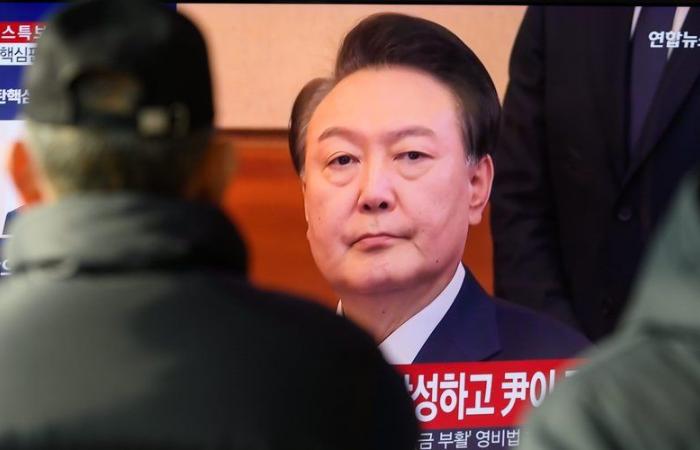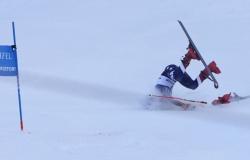South Korean investigators recommended, this Thursday, January 23, the indictment for rebellion and abuse of power of President Yoon Suk Yeol, detained and suspended from office, for his failed attempt to impose martial law which plunged the country in a serious crisis.
After 51 days of investigation, the Corruption Investigation Office (CIO), the anti-corruption agency which centralizes criminal investigations into Mr. Yoon, submitted its findings to the prosecution.
He said he had “decided to ask the Seoul Central District Prosecutor's Office to initiate charges against the current president, Yoon Suk Yeol, in connection with allegations including leading a rebellion.”
The prosecution now has 11 days to decide whether or not to launch the requested prosecution. Rebellion is a crime punishable by death.
In separate proceedings, Mr Yoon is due to attend the fourth hearing of his impeachment trial at the Constitutional Court at 2:00 p.m. (05:00 GMT) on Thursday, during which witnesses will be heard about his power grab .
“Uncooperative” attitude
On December 3, the conservative leader stunned South Korea by suddenly imposing martial law and sending the army to Parliament to try to muzzle him. He reversed course a few hours later, following a vote by deputies gathered urgently and under pressure from demonstrators.
Eleven days later, Mr. Yoon was seized of power by the National Assembly, which adopted an impeachment motion against him, now being examined by the Constitutional Court.
After resisting an initial raid on the orders of the authorities, Mr. Yoon was arrested and detained on January 15. An unprecedented fact for a titular South Korean head of state, which he officially remains until the decision of the Constitutional Court.
Since his placement in pre-trial detention, Mr. Yoon, who says he does not recognize the legality of the investigation targeting him, has continued to reject summons from the IOC. He “consistently maintained a non-cooperative attitude,” Lee Jae-seung, the IOC's deputy head, told reporters.
Mr. Yoon's security detail “impeded searches and seizures, including access to secure communications devices such as confidential telephones,” Mr. Lee continued.
Given the attitude of the deposed president, the IOC judged that it would be “more effective” to entrust the case to the public prosecutor's office, which is able to indict him.
-In response, Mr. Yoon's legal team on Thursday urged the prosecution to “conduct an investigation that respects legal legitimacy and due process.”
“Abused his authority”
In the findings of its investigation, the IOC said that Mr. Yoon had “abused his authority forcing police officers from the National Assembly Guard Unit and martial law forces to perform tasks that exceeded their duties “.
On the night of December 3, Mr. Yoon reportedly ordered the army to storm Parliament and prevent MPs from voting on a resolution calling for the lifting of martial law.
According to South Korean investigators, Mr. Yoon also “obstructed the exercise of lawmakers’ right to demand the lifting of martial law.”
Mr. Yoon denies having ordered the army to “take out” MPs from Parliament to prevent them from voting against martial law.
He and his legal team are trying to defend the idea that the declaration of martial law was necessary in the face of electoral fraud, the opposition having won hands down the legislative election of April 2024. With an overwhelming majority at stake. in Parliament.
The Constitutional Court must decide by mid-June whether it confirms the dismissal of the conservative leader or whether it reinstates him in office.
In the event of impeachment, a new presidential election must be organized within 60 days.
The protracted crisis pushed the Central Bank to lower its economic growth forecast for 2025 on Monday to 1.6%-1.7%.
Already in the fourth quarter of 2024, GDP growth in Asia's fourth-largest economy has slowed to 0.1%, its lowest rate of the year.






